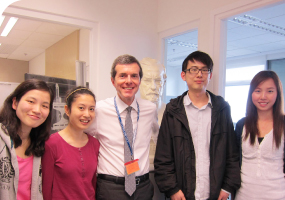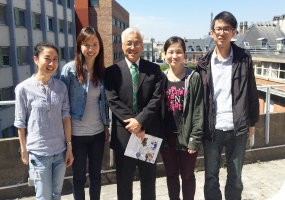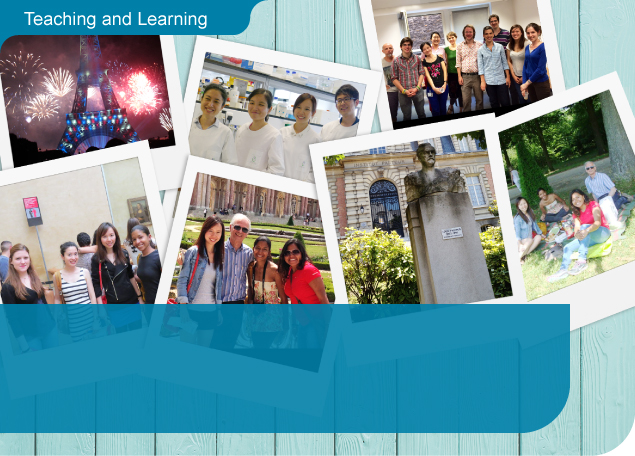Three HKU students have spent the summer in France studying at the renowned Institut Pasteur thanks to the L’Oréal Scholarship for Research Internship, founded in 2012 with the aim of giving PhD students from Hong Kong and Macau a taste of what it would be like to do research in France full-time.
Former university administrator Anthony Tsui Tin-yau, now perhaps best known for his work with the Croucher Foundation, a private body specialising in funding projects to promote scientific standards in Hong Kong, explained how the L’Oréal Scholarship came about.
“We’re particularly keen to develop scientific relationships between Hong Kong and other countries, thereby increasing exposure and competitive strength of scientists in Hong Kong,” he said. “While for historical and cultural reasons, the scientists’ network between Hong Kong and English-speaking countries has existed for a long time, links with non-English-speaking countries have been weaker. Yet many major scientific discoveries and medical breakthroughs have come from scientific communities in the non-English world.”
He wanted to strengthen those links, but found a major challenge was persuading Hong Kong students to pursue their studies in non-English-speaking countries – “students, even those at doctoral and postdoctoral levels, tend to be unadventurous”.
We’re particularly keen to develop scientific relationships between Hong Kong and other countries, thereby increasing exposure and competitive strength of scientists in Hong Kong.
Anthony Tsui Tin-yauForeign research environment
It was felt that what was needed was for them to get a foretaste of what to expect, and this is where L’Oréal stepped in to provide all the funds towards airfare and stipends so that selected Hong Kong students could be exposed to working in a French research environment in Institut Pasteur laboratories as interns for the summer.
“The L’Oréal Scholarship for Research Internship is a fabulous opportunity for dedicated research students from Hong Kong and Macau to join a centre of excellence at the heart of Europe’s scientific community, where they can learn from world-leading scientists while experiencing new approaches and a completely different culture,” said Professor Roberto Bruzzone, Co-Director of HKU–Pasteur Research Pole.
Three of this year’s four scholarship recipients came from HKU, while the fourth was Ms Lee Ying-ying from the Chinese University of Hong Kong.
Ms Candice Chang Yuen-yan, a PhD student in HKU’s Department of Chemistry, had her internship with Dr Jost Enninga’s Dynamics of Host-Pathogen Interactions Group in the Pasteur Institut’s Cell Biology of Infection Department. “I worked together with a postdoctoral fellow to study the influence of the bacterial effectors of Shigella flexneri on macropinocytosis, the formation of macropinosomes,” she explained.
“Dr Enninga was a very helpful and supportive supervisor. He completely trusted my competence and allowed me to work on the project independently. He encouraged discussions among group members, which enabled me to learn a lot from others, and he provided me with a lot of useful advice on both the research project and in developing a career in science.“
Tim Tsang Kam-lun, a PhD student in HKU’s School of Public Health, did his internship in Dr Simon Cauchemez’s Mathematical Modelling of Infectious Diseases Unit. He said: “This research experience enhanced my research skills a lot and I am more confident about a future career in research.”
Specific target
The research he was involved in used mathematical and statistical tools to model the influenza transmission in household settings. “One specific target in my internship was to identify and quantify characteristics that contribute to higher susceptibility (infected by influenza) or infectivity (ability to infect others after infection) for influenza,” he said. “We found that children were of both higher susceptibility and infectivity for influenza. This result suggests that vaccination programme targeting on children may be able to provide indirect protection to their household contacts.”
Karen Kwan Hoi-lam, a PhD student in HKU’s Department of Orthopedics and Traumatology, spent her internship working with Professor Jean-Marc Cavaillon’s Cytokines and Inflammation Unit, Infection and Epidemiology Department.
“Institut Pasteur is an internationally renowned institute for immunology research,” she said. “Since I have been studying the inflammatory response in wound healing for my PhD study, I believed that an internship there would bring me deeper understanding of the field of immunology and an opportunity to meet some bright scientists.
“I am new to immunology and Professor Cavaillon was very patient, explaining to me both the history and the latest research. He also welcomed discussion from which I learned to think critically and pay attention to detail. He was also kind enough to take some of his students and me to Versailles, the place where he grew up, and he taught us about France’s history.”
When they were not working in their respective institutes, the three found time to explore France and its lifestyle, lessons which they valued. Said Ms Chang: “There is a strong belief in French culture that people should live according to their will. I have learnt to enjoy work as much as to enjoy life. It is important to keep a balance between work and life so as to keep energetic every day.”■
 Professor Roberto Bruzzone (centre), Co-Director of HKU–Pasteur Research Pole, and the 2014 L’Oréal Scholarship awardees: (from left) Candice Chang Yuen-yan, Lee Ying-ying, Tim Tsang Kam-lun and Karen Kwan Hoi-lam.
Professor Roberto Bruzzone (centre), Co-Director of HKU–Pasteur Research Pole, and the 2014 L’Oréal Scholarship awardees: (from left) Candice Chang Yuen-yan, Lee Ying-ying, Tim Tsang Kam-lun and Karen Kwan Hoi-lam.
 The four scholarship recipients met Professor Paul Tam (centre), HKU Vice-President and Pro-Vice-Chancellor, when they took up internships at the world-famous Institut Pasteur in France.
The four scholarship recipients met Professor Paul Tam (centre), HKU Vice-President and Pro-Vice-Chancellor, when they took up internships at the world-famous Institut Pasteur in France.


